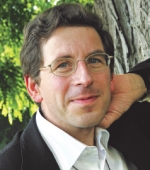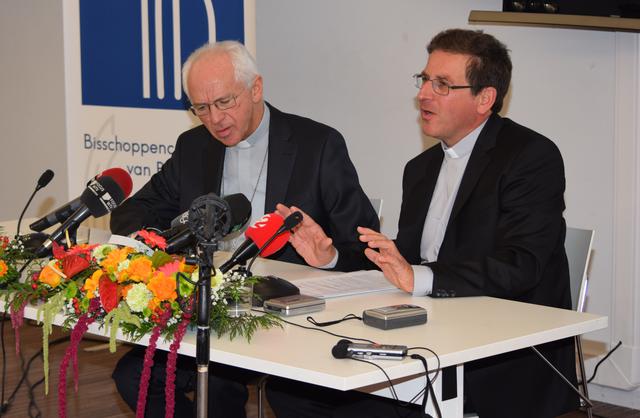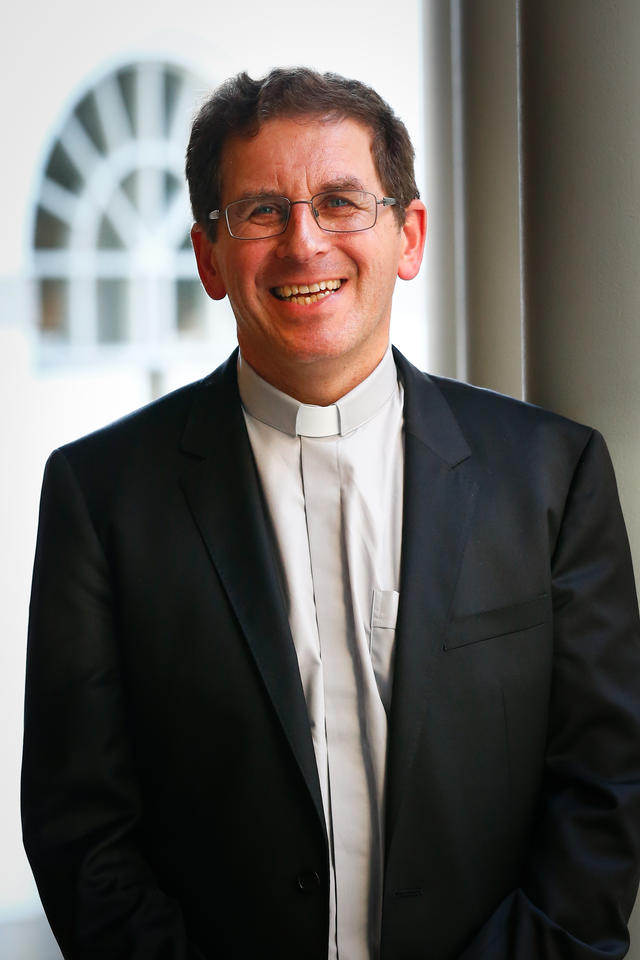The new bishop of Bruges comes from the neighbouring Diocese of Ghent. He has been the dean of Ghent for only about a month. Bishop-elect Lodewijk, Lode for short, Aerts will succeed Jozef De Kesel, the bishop who was appointed to the Belgian capital last year.
 At 57, the new bishop will be the youngest of the Belgian bishops. A priest since 1984, he is a doctor of theology, taught at the diocesan seminary and was responsible for the youth work, education and formation in Ghent. Earlier this year he was appointed as the dean of Ghent, one of the ten new deaneries created in that diocese.
At 57, the new bishop will be the youngest of the Belgian bishops. A priest since 1984, he is a doctor of theology, taught at the diocesan seminary and was responsible for the youth work, education and formation in Ghent. Earlier this year he was appointed as the dean of Ghent, one of the ten new deaneries created in that diocese.
In Bruges, Bishop-elect Aerts will be the 27th bishop since the diocese was created in 1559 (although in Napoleonic times it was part of Ghent for a while). He succeeds Jozef De Kesel, who was bishop of Bruges for five years. Before that, Bruges was headed by Roger Vangheluwe for 26 years. He was forced to step down after he admitted to sexually abusing a family member.
This appointment may be considered one of the list files worked on by retired Nuncio to Belgium, Archbishop Giacinto Berloco.
The official announcement of the new appointment was made in Brussels, as Belgian bishop appointments usually are, by Archbishop De Kesel, and the new bishop later travelled to Bruges to meet the staff of the diocesan offices. The consecration of Bishop Aerts is scheduled for 4 December in Bruges’ Cathedral of St. Saviour. The names of the three consecrating bishops have not been announced, but it is a safe bet that Archbishop De Kesel and Ghent’s Bishop Luc van Looy, who may be retired by that time, will be among them.

At the press conference in Brussels, Archbishop De Kesel listed some of Bishop-elect Aerts’ talents:
“He is theologically well-educated. But he also understands the art of communicating this in an understandable way. He is an enthusiastic speaker and possesses an excellent pen.”
He added that, while this is not sufficient to be a bishop, “it is very valuable.” Archbishop De Kesel also spoke about the new bishop’s approach to the relation between Church and society:
“He knows very well that the past lies behind us and that we, including the Church, live in a secular pluralistic society. But exacty then it is so important to know what matters. To make a distinction between what is really important for the future and what are ultimately always rearguard battles.”
The archbishop typified Bishop-elect Aerts as “a good man, not too conceited, with a big heart and very approachable.”

The new bishop himself, then, spoke about his vision of the Church: “The Church is no one-man business, but a people: people who feel adressed by God and through their unity bear witness that God is love.”
“I also see this in myself. In order to speak credibly about God, I could do nothing by myself. My words needed the support of fellow faithful who, together with me, put the trust in God into practice. Without their friendship, their humanity, their efforts and their confidence it was not possible.”
Some more quotes to get an idea of what the new bishop of Bruges considers important in his life and work as a Catholic, a priest and a bishop:
“It is not good that Christians impose themselves. But they also should not be ashamed. As far as I am concerned, the faith is the best that ever happened to me. It is the experience of God accepting me for who I am, that I need not pretend to be better than I am before Him, that He accompanies me though life and that His hand will never let me go.”
“It is my greatest joy to notice that this trust lets other people bloom and makes them free and independent. To share this faith, I want to take on the duties of a bishop.”
Photo credit: [2] IPID, [3] Kur Desplenter
 Marking the abdication of Pope Benedict XVI, which becomes effective in the evening of 28 February, all Dutch and Flemish dioceses will be offering a thanksgiving Mass for his pontificate. With the exception of Haarlem-Amsterdam and Antwerp, all will do so on the day of abdication itself.
Marking the abdication of Pope Benedict XVI, which becomes effective in the evening of 28 February, all Dutch and Flemish dioceses will be offering a thanksgiving Mass for his pontificate. With the exception of Haarlem-Amsterdam and Antwerp, all will do so on the day of abdication itself.